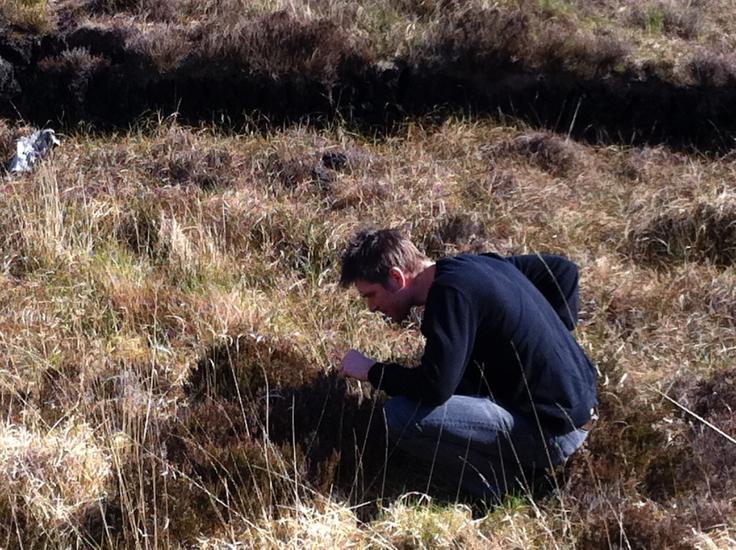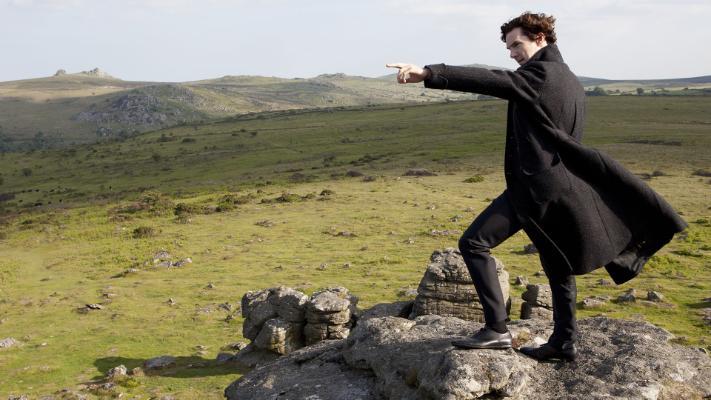In This Section
The Ecological and Cultural Futures of Peatlands

The Ecological and Cultural Futures of Peatlands
Our second blog post is by invited Peatlands Conference speaker Dr Derek Gladwin (www.derekgladwin.com), author of Contentious Terrains: Boglands, Ireland, Postcolonial Gothic (http://www.corkuniversitypress.com/Boglands-in-the-Irish-Postcolonial-Gothic-p/9781782052043.htm)

Derek Gladwin up close to the peat (Connemara, Ireland)
Peatlands are vital wetland ecosystems around the planet. Covering approximately 400-500 million hectares of the world's surface (about 8%), though largely found in northern latitudes, peatlands are as significant to the world's landmass as are tropical forests or deserts in terms of surface area.[1] Peatlands are particularly of focus right now because of how they reduce global climate change. They act as carbon sequestration units (or sinks) which are places where carbon dioxide is captured from the atmosphere. In fact, 20% of the world's terrestrial carbon is captured and stored in peatlands located in the northern hemisphere.[2] This is why the destruction of peatlands through mismanagement, urban development, and peat extraction for fuel – accelerates climate change. Removing peatlands not only reduces the landmasses where carbon can be captured and stored, but it also releases stored carbon for several millennia back into the atmosphere. It's an exponential problem related to the Earth's ecological future.
If peatlands widely benefit both humans and non-humans, as well as the Earth, then why are they continually neglected or relegated as wasted space for development or fuel production? In Europe, for example, 90% of wetlands (mostly consisting of peatland) have been destroyed. This figure parallels Ireland's overall peatland loss at 92%.[3] Much like glaciers on the poles of the Earth, peatlands are a barometer for a healthy planet both past and future. Changing the ecological futures of peatlands directly relates to changing the ways in which people perceive and value them. Understanding and addressing this issue is a trans-disciplinary process, one that unifies a range of critical frameworks beyond one disciplinary perspective. It's collective and multifaceted. In order to reduce climate change, we must first address cultural change.
When approached from an environmental humanities perspective, we might uncover the significance and pervasiveness of peatlands in culture and society. The aim of the environmental humanities is to understand the relationship among human values, perception, and imagination as it relates to surrounding environments through social action. However, the trans-disciplinary link between the sciences and humanities remains somewhat disconnected. Humans draw on language, narrative, imagination, and cognitive models in order to conceptualise problems and mobilise change as much as they do, if not more, then interpreting data.[4] Mobilising change and influencing behavioural shifts emerges from cultural influence.

Promotional image for BBC 2's 'Outlander', set in an upland peatland
There already exists a rich history of peatlands represented in cultural production within the arts and humanities. What would Emily Brontë’s Wuthering Heights (1847) be without Heathcliff traipsing across the Yorkshire Moors? How could we receive Thomas Hardy's Return of the Native (1887) without the living character of Edgon Heath or Sherlock confronting the real and imagined mysteries of Dartmoor in Arthur Conan Doyle's Hound of the Baskervilles (1902)? Even more recent television programmes, such as Outlander (see image above), Shetland, or Sherlock (see image below), uses peatlands as representative settings and symbols. In all of these examples, among many others, peatlands hover in the consciousness of our cultural imagination. But it's not because they function as carbon sinks or because they are some of the biodiverse ecosystems on the Earth, but because peatlands remain implanted in our memories through story, imagery, and cultural history.

BBC's 'Sherlock', on the peatland of Dartmoor, southwest England
Global climate action is not only about science and facts; it's also about changing perceptions and values. Climate change is associated with cultural change. In the same way, the ecological futures of peatlands coincide with our cultural futures as much as they have with our cultural pasts. The environmental activist and author Bill McKibben argues, ‘The real fight — all real fights — are over the zeitgeist. They're about who controls the vision of the future. [5] In other words, whoever controls the narrative of the present can change the future?
How we change the ways we perceive and imagine our environmental and energy futures depends upon social framing and responses. Film, literature, art, and media, just to offer a few examples in the arts and humanities, have the power to alter such perceptions and shift the climate narrative for the future. Similarly, we must write, imagine, and perceive our future in the trans-disciplinary ways that benefit the survival of humans and non-humans by constructing narratives that depict sustainable social and ecological futures. In turn, we must resist stories that say this is impossible. The remaining peatlands around the globe function as such narratives that reveal some of the potentially unanswered questions in both cultural and environmental history. Notes:
[1] Stuart McLean, ‘“To Dream Profoundlyâ€: Irish Boglands and the Imagination of Matter’, Irish Journal of Anthropology 10.2 (2007): 61.
[2] ‘Climate Change: Mitigation – Carbon Capture and Storage’, Earthwatch Educational Resources, Climate Change 5 (2007): 3.
[3] Peter Foss and Catherine O'Connell, ‘Bogland: Study and Utilization’, in John Wilson Foster (ed.), Nature in Ireland: A Scientific and Cultural History (Montreal: McGill-Queen's University Press, 1997): 195. See also P.J. Foss and C. A. O'Connell, Irish Peatland Conservation Plan 2000 (Dublin: Irish Peatland Conservation Council, 1996).
[4] Poul Holm, Joni Adamson, Hsinya Huang, Lars Kirdan, Sally Kitch, Iain McCalman, James Ogude, Marisa Ronan, Dominic Scott, Kirill Ole Thompson, Charles Travis, and Kirsten Wehner, ‘Humanities for the Environment – A Manifesto for Research and Action’, Humanities 4 (2015): 977-992.
[5] Bill McKibben, ‘With the Rise of Trump, Is it Game Over for the Climate Fight?’, Yale Environment 360, 23 January 2017. http://e360.yale.edu/features/with-the-ascent-of-trump-is-it-game-over-for-the-climate-fight.
Irish Peatland Archaeology Across Time (IPeAAT)
Contact us
